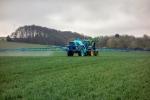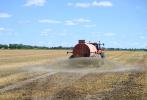
AGROFERT Operational Group: New biofertilizer products for sustainable crop production in the Lower Guadalquivir
- Type Operational group
- Status In progress
- Execution 2023 -2025
- Assigned Budget 299.667,00 €
- Scope Autonómico
- Autonomous community Andalucía
- Project website GO AGROFERT
The AgroFert project aims to deliver a biofertilizer that can reduce the need for synthetic nitrogen fertilizers by up to 40–80 kg per hectare, improving soil health and crop yields. Expected outcomes include increased nitrogen fixation in the soil through the use of amino acid-based biofertilizers, particularly N-methylglycine, which acts in symbiosis with soil bacteria. This approach will not only reduce nitrate pollution in water sources but also increase plant resistance to stress, improving overall productivity.
The main practical recommendation is to incorporate this biofertilizer into the crop management cycle, especially for winter crops such as beets and carrots, summer crops such as tomatoes and cotton, and perennials such as olives. The main value for farmers lies in the cost savings from reduced fertilizer use, improved soil structure, and increased long-term yields. By reducing dependence on synthetic fertilizers, farmers can reduce production costs, lessen their environmental impact, and comply with stricter environmental regulations.
Furthermore, the biofertilizer's ability to improve plant resistance to stress will result in more consistent harvests, ensuring improved marketability and profitability. Farmers can take advantage of this innovation by incorporating it into their existing practices with minimal disruption, helping them transition to more sustainable agriculture without losing productivity, and even increasing it.
The project includes field trials on selected crops, the application of a biofertilizer at different doses, and monitoring its effects on soil microbiota and crop yield.
Activities also include soil and plant nutrient analysis, carbon footprint estimation, and the use of metagenomics to assess microbial diversity. The results will be disseminated through publications and events aimed at interested parties.
This project was developed in response to the problems arising from the excessive use of synthetic nitrogen fertilizers in intensive agriculture, which has caused nitrate contamination in groundwater and surface water, especially in vulnerable areas such as the Lower Guadalquivir.
The legislative context, with regulations limiting the use of synthetic nitrogen, is driving the search for sustainable solutions, such as biofertilizers, which offer an environmentally friendly alternative.
The project seeks to address the environmental challenges caused by the excessive use of nitrogen fertilizers in agriculture, especially in the Lower Guadalquivir region.
The main objective is to reduce the use of synthetic nitrogen fertilizers by introducing a biofertilizer based on amino acids and N-methylglycine, improving crop yields and reducing nitrate pollution in water bodies.
- Coordinator/entity name: AGROQUIVIR SCA DE 2º DEGREE
- Postal address: Ctra. Nacional IV, km. 573 s/n CP: 41720 Los Palacios y Villafranca, Seville
- Coordinator/entity email: anasierra@agroquivir.es
- Telephone: 653807550
The AgroFert project is aligned with the European Union's priorities in terms of agricultural sustainability, carbon footprint reduction, and water resource protection. The goal is to develop a product that can be implemented on a large scale, contributing to the sustainability of the agricultural sector and improving soil and water quality in the region.
The project's success will depend on acceptance by farmers and other stakeholders in the agricultural sector. One potential obstacle is the potential reluctance to adopt new practices in traditional crops. However, demonstrating both economic and environmental benefits through the results obtained could facilitate long-term implementation. Continued research into adapting biofertilizers to different climatic conditions and soil types is recommended.
- AGROQUIVIR S.C.A. DE 2º GRADO
- COOPERATIVAS AGROALIMENTARIAS DE ANDALUCIA (cdiaz@agroalimentarias-andalucia.coop)
- CSIC-IBVF (vicente.mariscal@ibvf.csic.es)
- AGROQUIVIR S.C.A. DE 2º GRADO







